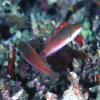-
Posts
16,553 -
Joined
-
Last visited
-
Days Won
29
Content Type
Profiles
Forums
Gallery
Everything posted by yikai
-

The world's fairy wrasses of the genus Cirrhilabrus
yikai replied to yikai's topic in FOWLR (Fish-only with Live-rock)
Cirrhilabrus condei Conde's fairy wrasse. Papua New Guinea to northern Great Barrier Reef and Fiji. Occurs in groups. Males display in 2 forms. One form is very unique, with only the front 2/3 of the dorsal fin erected. Dorsal fin has a black margin. A gorgeous species when displaying. First pic of an unexcited male, 2nd pic of a male flashing (var 1) and 3rd pic of another male flashing (var 2). Take note of the dorsal fin in the 2nd variant of flashing. Only the first 2/3 is erected. -

The world's fairy wrasses of the genus Cirrhilabrus
yikai replied to yikai's topic in FOWLR (Fish-only with Live-rock)
Cirrhilabrus luteovittatus Velvet fairy wrasse. Known from eastern islands and atolls of Micronesia and Marshall Islands. Males have a distinct yellow band behind pectoral fin to the caudal penducle. Occurs in small groups along reef margins and over rubble substrate. -

The world's fairy wrasses of the genus Cirrhilabrus
yikai replied to yikai's topic in FOWLR (Fish-only with Live-rock)
Cirrhilabrus randalli Randall's fairy wrasse. Known only from Rowley Shoals and Scott & Hibernia Reefs in the Timor Sea, both regions way off the north-western Australian coast. A geographical variation of the "cyanopleura-complex". The yellow band has developed similarly to C. lyukyuensis, another sibling species. Extremely rare in the trade and none to date, have been imported. This species is not on fishbase.org -

The world's fairy wrasses of the genus Cirrhilabrus
yikai replied to yikai's topic in FOWLR (Fish-only with Live-rock)
Cirrhilabrus cf cyanopleura Females are very distinct with pink head and parts of the body. Males look virtually identical to C. cyanopleura. The difference in female colouration for both species indicate that this is a different, undescribed species. First pic female, 2nd pic females and male. -

The world's fairy wrasses of the genus Cirrhilabrus
yikai replied to yikai's topic in FOWLR (Fish-only with Live-rock)
Cirrhilabrus solorensis Solar Wrasse Indonesia, from Flores and Banda Seas to North-eastern Sulawesi and west to Bali. Eyes are bright red and males have purple band on the edge of gill cover. -

The world's fairy wrasses of the genus Cirrhilabrus
yikai replied to yikai's topic in FOWLR (Fish-only with Live-rock)
Cirrhilabrus cf solorensis Restricted to northern Bali to Flores Sea. Dull grey head with orange backs. Sub-males look like C. cyanopleura. First 2 pics male, last pic female. -

The world's fairy wrasses of the genus Cirrhilabrus
yikai replied to yikai's topic in FOWLR (Fish-only with Live-rock)
Cirrhilabrus aurantidorsalis Orange-back fairy wrasse. Known only from Tomini Bay, Sulawesi. Occurs in small groups in depths of 25m. Males are orange dorsally and have a pink stripe beneath, to the caudal penducle. Females look similar, juveniles are brownish. -

The world's fairy wrasses of the genus Cirrhilabrus
yikai replied to yikai's topic in FOWLR (Fish-only with Live-rock)
Cirrhilabrus lyukyuensis Yellow-flanked fairy wrasse. Japan and Philippines, Malaysia and Northern Indonesia. They are rare in Bali and are occasionally found swiming together with Cirrhilabrus solorensis and Cirrhilabrus cyanopleura. Used to be considered a variant of C. cyanopleura but considered a new species. First pic male, 2nd pic females. -

The world's fairy wrasses of the genus Cirrhilabrus
yikai replied to yikai's topic in FOWLR (Fish-only with Live-rock)
Cirrhilabrus cyanopleura Blue-sided fairy wrasse. Andaman sea to Java, they are found in coastal and inner reefs, and form large schools. Males have a patch of scales with purple margins in the center of the body. There is a "cyanopleura-complex" which includes several undescribed species in Bali and Flores. -

The world's fairy wrasses of the genus Cirrhilabrus
yikai replied to yikai's topic in FOWLR (Fish-only with Live-rock)
Cirrhilabrus punctatus Fine-spotted fairy wrasse. Wide range in Australia and nearby islands, adults are brown to dark green-blue on sides and are white ventrally. Many small blue spots scattered on the body and median fins. Juveniles are small, brown with white snout. Fijian variants appears to be a different species, sometimes with yellow streaks on the body. first pic of a female, 2nd pic male, 3rd pic male. -

The world's fairy wrasses of the genus Cirrhilabrus
yikai replied to yikai's topic in FOWLR (Fish-only with Live-rock)
Cirrhilabrus beauperryi Beauperry's fairy wrasse. Very closely related to Cirrhilabrus punctatus, but is known only from the Solomon Islands and New Guinea. Adults are greenish ocre above, reddish sides and blue ventrally. Very long ventral filaments. Small blue spots extend well towards median fins. Juveniles and females are look alot like C. punctatus and are almost indistinguishable. First pic of a male, 2nd pic of a nuptial male. -

The world's fairy wrasses of the genus Cirrhilabrus
yikai replied to yikai's topic in FOWLR (Fish-only with Live-rock)
Cirrhilabrus balteatus Girdled fairy wrasse This is a Marshall Island endemic, which means it is found only in the Marshall Islands. It resembles Cirrhilabrus katherinae. Forms small schools over coral or rubble. Males swim high in the water to feed on zooplankton. The Girdled fairy wrasse is part of the "temminckii-complex" but is the easiest to differentiate, with the presence of a large orange blotch on the body. Females are reddish and dull, very rare in the trade. -

The world's fairy wrasses of the genus Cirrhilabrus
yikai replied to yikai's topic in FOWLR (Fish-only with Live-rock)
Cirrhilabrus katherinae Katherine's fairy wrasse From Izu Island Japan and the Mariana Islands in Guam. Females are red with a yellow dorsal region and head. Males are closely related to Cirrhilabrus punctatus. First 2 pictures of a male, last picture of a harem of females and juveniles. -

The world's fairy wrasses of the genus Cirrhilabrus
yikai replied to yikai's topic in FOWLR (Fish-only with Live-rock)
Cirrhilabrus cf temminckii 2 This variant of the temminckii complex occurs in western Australia, and is not avaialble to us. Lacks the black pigmentation on the pectoral fin base which other variants of "temminckii-complex" possess. -

The world's fairy wrasses of the genus Cirrhilabrus
yikai replied to yikai's topic in FOWLR (Fish-only with Live-rock)
Cirrhilabrus cf temminckii 1 Blue-lined fairy wrasse. This is the first variant of the "temminckii complex", which is a group of fairy wrasses that look very identical to the true Temminck's fairy wrasse. This is variant 1. The scientific name has a "cf" between genus and species name, which means confer, inferring the similarity and comparison between the true temminckii. From Indonesia and Malaysia, Taiwan and southern Japan. This is the most common variant offered in LFS. -

The world's fairy wrasses of the genus Cirrhilabrus
yikai replied to yikai's topic in FOWLR (Fish-only with Live-rock)
Cirrhilabrus temminckii Temminck's fairy wrasse The true Temminck's fairy wrasse is found in the Izu peninsula to the Ryuku Islands. There are many closely related variants found in Indonesia and western Australia. These are not the true Temminck's fairy wrasse, but represent different species, from the "Temminckii-complex". Nuptial males display blue-white colouration over most of their back. First 2 pictures of an unexcited male, last picture of a male displaying nuptial colouration. -

OMG! Look at these hybrids and rare fishes!
yikai replied to Digiman's topic in FOWLR (Fish-only with Live-rock)
-

OMG! Look at these hybrids and rare fishes!
yikai replied to Digiman's topic in FOWLR (Fish-only with Live-rock)
-

OMG! Look at these hybrids and rare fishes!
yikai replied to Digiman's topic in FOWLR (Fish-only with Live-rock)
-

OMG! Look at these hybrids and rare fishes!
yikai replied to Digiman's topic in FOWLR (Fish-only with Live-rock)
-

11-Oct-2010 to 18-Oct-2010
yikai replied to iskay's topic in Weekly LFS Stocks Report / LFS Info Centre
alot of sunset anthias at iwarna (Pseudanthias parvirostris). No males. also a small group of Princess anthias (Pseudanthias smithvanizi) -

Algae Blenny losing weight.
yikai replied to girlanimated's topic in FOWLR (Fish-only with Live-rock)
no algae in tank, supply with nori. -
thread moved



































